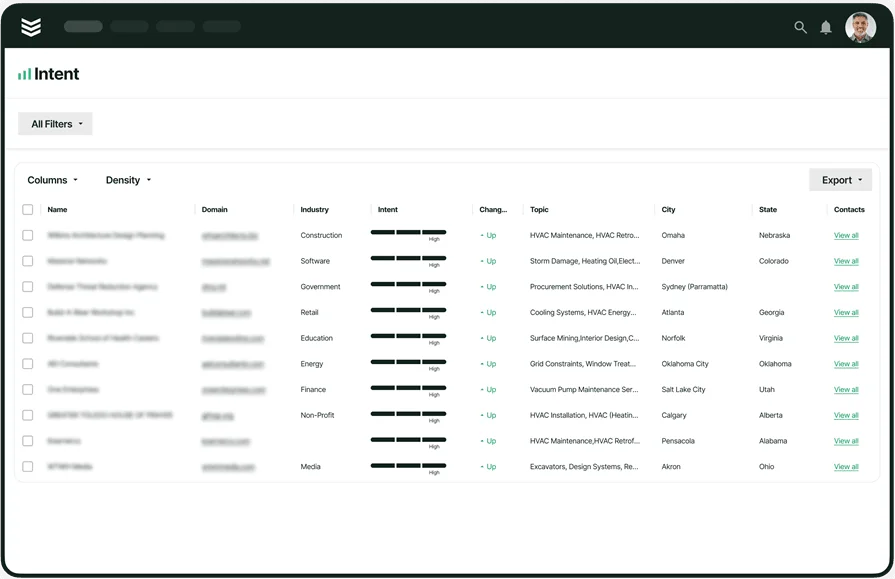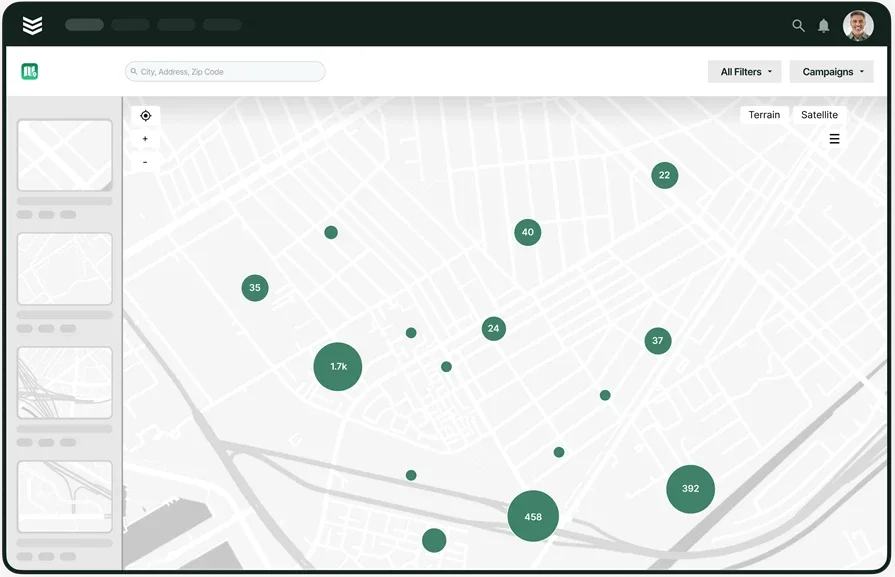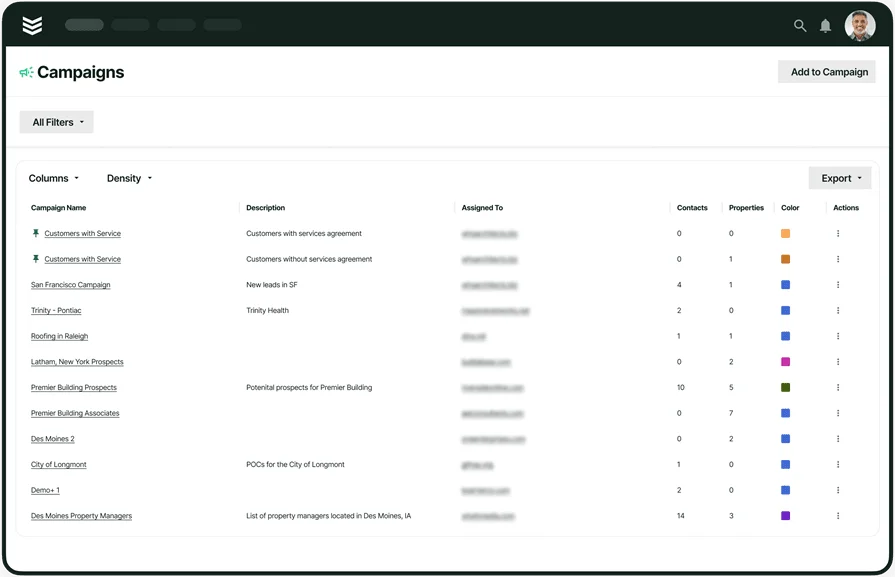Running a contracting business means juggling bids, job schedules, crew assignments, and customer communication—all while making sure cash flow stays strong. Without a solid system, things slip through the cracks, and that’s where having a CRM system makes all the difference. It keeps everything in one place, so you’re not scrambling to find job details, follow up on leads, or chase down unpaid invoices.
But not all CRMs are built for contractors. Some are too generic, missing key features like scheduling, dispatching, or field service management. Others are packed with unnecessary tools that only slow you down. The right CRM should fit how contractors actually work—whether you’re running a small crew or managing multiple job sites.
In this guide, we’ll cover:
- How to choose the right CRM for contractors
- 5 features to look for in CRM software for contractors
- Types of companies that need contractor CRM software
- 8 best CRMs for contractors
- 7 benefits of CRM software for contractors
- 4 important contractor CRM FAQs answered
A CRM is only as good as how well it fits your business. Before committing to a system, it’s important to know what to look for and what questions to ask. Let’s break down what matters most when choosing a contractor-specific CRM.
How to choose the right CRM for contractors
The best CRM should help you manage leads, track jobs, streamline communication, and keep cash flow moving without adding extra headaches. But with so many options out there, where do you start?
Here are the key things to consider before making a decision:
- Business size & scope – Does the CRM fit your operation? Whether you’re running a small crew or managing multiple job sites, the system should scale with your business and not be overloaded with features you don’t need.
- Job & customer tracking – Can it keep up with your workload? You need a CRM that tracks jobs from start to finish, logs customer interactions, and makes it easy to pull up job history when a client calls.
- Integration with existing tools – Will it work with what you already use? A good CRM should connect with your scheduling software, accounting system, and estimating tools, so you’re not constantly switching between platforms.
- Mobile accessibility – Can your team access it from the field? Your crew shouldn’t have to be in the office to update job details, send invoices, or check schedules. A mobile-friendly CRM keeps everything running smoothly.
- Features – Does it include the tools that actually help? Look for essentials like automated follow-ups, document storage, invoicing, and real-time job updates that save time and improve efficiency.
Choosing a CRM is about making your business run smoother, not more complicated. Once you know what to look for, the next step is understanding which features will have the biggest impact on your day-to-day operations.
5 features to look for in CRM software for contractors
For contractors, the right CRM system isn’t just about storing customer data—it should actively help you manage projects, track jobs, and keep cash flow moving. The best CRMs come with features that solve the real challenges contractors face daily, whether it’s chasing down unpaid invoices, scheduling field teams, or keeping job details from slipping through the cracks. Here are five must-have features:
1. Job & customer tracking
Keeping track of leads, active jobs, and past projects shouldn’t be a guessing game. A solid CRM lets you log every customer interaction, track job progress, and pull up work history in seconds. Imagine a client calls about a repair done six months ago—you don’t have time to dig through emails or paper records. With the right CRM, you can pull up their job details instantly, giving you everything from past invoices to technician notes without missing a beat.

Check out our CRM solution
BuildOps helps contractors manage client lists and keep operations running smoothly.
2. Invoicing & payments
Cash flow is everything in contracting, and waiting weeks for payments can put you in a bind. A CRM with built-in invoicing and payment tracking ensures you get paid on time. Let’s say you just wrapped up a job, and the homeowner says they’ll "mail a check later." Instead of chasing it down, your CRM lets you send an invoice on the spot, offer digital payment options, and track overdue payments automatically—so you can focus on the next job instead of unpaid bills.
3. Mobile access for field techs
Your team isn’t tied to a desk, so your CRM shouldn’t be either. A field service system with mobile access lets your crew update job notes, upload photos, and check schedules right from the field. Picture a technician arriving on-site only to realize they’re missing key details about the job. Instead of calling the office for info, they can pull up job history, access work orders, and even send real-time updates—all from their phone. That means fewer delays and a smoother workflow.
4. Scheduling & dispatching
Last-minute schedule changes happen all the time. Whether it’s a no-show employee or a high-priority emergency call, a field service scheduling and dispatching software keeps everything running smoothly. Imagine you get a call from a commercial client with a major HVAC failure. Instead of scrambling, your CRM lets you see which tech is available, assign the job instantly, and notify them with all the details—without a single phone call.
5. Automated follow-ups & reminders
A CRM should help you stay on top of follow-ups without adding more work to your plate. Whether it’s sending reminders for maintenance contracts, requesting reviews, or following up on estimates, service agreement software handles that.. Think about that customer who said, “I’ll think about it” after getting an estimate. Instead of losing the lead, your CRM automatically sends a follow-up a few days later, keeping your business top of mind—without you lifting a finger.
Other valuable features contractors should look for in a construction CRM
Some CRM features might not be deal-breakers, but they can make life easier and help contractors stay ahead of the game. Here are a few worth considering:
- Fleet & asset tracking – Managing trucks, heavy equipment, and tools is just as important as managing jobs. A CRM with fleet tracking lets you monitor vehicle locations, track maintenance schedules, and ensure your crew always has the right equipment on-site. No more lost tools or unexpected breakdowns that throw off your schedule.
- Time tracking & payroll integration – Keeping track of labor hours can be a headache, especially with crews working across multiple job sites. A CRM with built-in time tracking ensures accurate payroll, reduces disputes, and helps you stay on top of labor costs. No more chasing timesheets or guessing who worked where.
- Custom reporting & analytics – Data-driven decisions separate growing contractors from those just getting by. A CRM with custom reporting lets you analyze job costs, track profitability, and spot trends in your business. Want to know which services bring in the most revenue or which techs close the most service calls? A solid reporting tool gives you those answers fast.
A great CRM doesn’t just organize your business—it helps you operate smarter and grow faster. Now that we’ve covered the features, let’s look at which types of contracting businesses benefit the most from using a CRM.
Types of companies that need contractor CRM software
Contracting isn’t one-size-fits-all. Whether you’re running a large commercial operation or working as a solo contractor, the right CRM software can help keep jobs organized, improve customer relationships, and streamline invoicing. Here’s a look at different industries and business types that benefit from contractor CRM software.
- HVAC contractors – Keeping track of service agreements, dispatching techs efficiently, and managing seasonal demand all require an HVAC system that can automate scheduling, send maintenance reminders, and store equipment history for every client. The right CRM makes sure no tune-up or repair job falls through the cracks.
- Plumbing businesses – Whether handling emergency calls or large-scale installations, plumbers need a CRM that can manage work orders, track inventory, and streamline invoicing. A system with job history tracking helps plumbers quickly access past repairs, ensuring faster diagnostics and better customer service.
- Electrical contractors – From residential wiring projects to large-scale commercial jobs, electricians juggle multiple projects at once. A CRM with scheduling, task tracking, and proposal management keeps everything running smoothly—especially when coordinating multiple electricians on a job site.
- Mechanical & engineering firms – Large mechanical and engineering firms work on complex, long-term projects that require detailed documentation, team collaboration, and seamless communication between contractors and clients. A CRM with project tracking, document storage, and workflow automation is essential for managing large-scale jobs.
- Refrigeration contractors – Refrigeration businesses handle installation, maintenance, and emergency service calls for commercial cooling systems. A CRM with service agreement tracking, dispatch automation, and asset management helps ensure customers’ equipment stays up and running, preventing costly downtime.
- Fire safety contractors – Fire protection companies manage inspections, installations, and compliance reporting for fire suppression systems. A CRM with inspection scheduling, compliance tracking, and automated follow-ups ensures that fire safety systems remain up to code and properly maintained.
- Construction sales teams – Sales teams in construction need to manage leads, bids, and follow-ups without letting potential deals slip through the cracks. A CRM with pipeline management and automated follow-ups ensures sales reps stay on top of every opportunity.
- Independent contractors – Whether you’re a one-person operation or working with a small crew, a CRM helps you manage client relationships, keep track of invoices, and schedule jobs more efficiently. A tool with mobile access and automated reminders allows independent contractors to run their business on the go.
No matter the industry, a CRM helps contractors stay organized, improve customer service, and run a more profitable business. Next, let’s look at some of the best CRMs available for each type of contractor today.
8 best CRMs for contractors
Finding the right Contractor CRM depends on the type of work you do. Some CRMs are built for residential service businesses, while others cater to large-scale commercial operations. Below, we’ve broken down the best CRMs for contractors based on industry specialization.
1. BuildOps: Best for commercial contractors
BuildOps is the ultimate all-in-one platform for commercial contractors. It’s designed to handle every aspect of your business—from scheduling and dispatching to invoicing, reporting, and job tracking. Whether you run an HVAC company, a mechanical service firm, or a large-scale construction business, BuildOps gives you a single, integrated solution to manage everything in one place.
Unlike other CRMs that require multiple add-ons or third-party integrations, BuildOps is built specifically for commercial contractors, meaning it includes advanced dispatching, service agreements, technician tracking, and in-depth project management tools—right out of the box.
How Pricing Works: We provide live demos every week, and you may request a demo anytime it is most convenient for you. This allows you to look into the qualities and select the most suitable solution for your needs.
Features Beyond CRM: Scheduling & dispatch, invoicing, job tracking, reporting, fleet management, and technician mobile app.
What Sets It Apart for Commercial Contractors: Built specifically for commercial contractors, BuildOps delivers industry-specific features that other generic CRMs lack—without the need for complicated add-ons.

Want to see it in action?
Keep your operation running smoothly—all from a single platform.
2. Jobber: Best for residential contractors
Image Source: Jobber
Jobber is a great fit for residential contractors—especially those in HVAC, plumbing, and electrical work—who handle service calls for homeowners. It simplifies scheduling, invoicing, and customer management, making it a good choice for small to mid-sized teams that need an easy way to stay organized without complicated software.
However, Jobber is designed for smaller, service-based businesses, so if you manage large-scale commercial projects or require advanced job costing and multi-location tracking, it may not be the right fit.
How Pricing Works: Starts at $69/month for core features, with higher-tier plans for additional automation and reporting tools.
Features Beyond CRM: Customer self-service portal, appointment scheduling, quoting, and invoicing.
3. Tradify: Best for general contractors
Image Source: Tradify
Tradify is built for general contractors who manage a variety of projects across different trades, from small renovations to full-scale builds. It helps with quoting, scheduling, and job tracking, making it a good fit for contractors who juggle multiple jobs and subcontractors at once.
While it’s easy to use, Tradify may not be ideal for larger construction firms that need deep project management features or integration with advanced accounting tools.
How Pricing Works: Starts at $39/month per user.
Features Beyond CRM: Quoting, time tracking, and subcontractor management.
What Sets It Apart for General Contractors: Its all-in-one job tracking dashboard helps general contractors manage multiple projects from start to finish.
4. FieldEdge: Best for HVAC contractors
Image Source: FieldEdge
FieldEdge is designed for HVAC contractors who need real-time dispatching, customer management, and job tracking. It helps HVAC businesses streamline operations by automating service agreements, tracking equipment history, and optimizing technician scheduling.
However, though they offer services to other industries as well, it may not be ideal for contractors who work beyond HVAC services, as its features are catered especially for HVAC businesses.
How Pricing Works: Subscription-based pricing with a monthly per-user fee. Custom quotes are available based on business size.
Features Beyond CRM: Service agreement tracking, dispatch optimization, and job costing.
What Sets It Apart for HVAC Contractors: Its real-time technician tracking and service agreement automation ensure HVAC businesses stay on top of maintenance contracts and emergency service calls.
5. Buildertrend: Best for home builders & remodelers
Image Source: Buildertrend
Buildertrend is a top choice for home builders and remodelers, offering tools for project management, client communication, and budgeting. It helps contractors manage everything from initial estimates to final walkthroughs, keeping jobs on schedule and within budget.
While great for residential construction, Buildertrend may not be the best fit for commercial contractors handling large-scale infrastructure projects that require advanced document control and compliance tracking.
How Pricing Works: Monthly subscription model with tiered pricing based on features needed.
Features Beyond CRM: Budgeting, material tracking, and customer communication tools.
What Sets It Apart for Home Builders & Remodelers: Its change order tracking and financial management tools help builders stay on budget and prevent cost overruns.
6. CoConstruct: Best for custom home builders
Image Source: CoConstruct
CoConstruct is built for custom home builders who manage one-off projects with highly detailed specifications. It provides tools for client selections, budget tracking, and subcontractor coordination, ensuring seamless communication between homeowners, contractors, and vendors.
However, CoConstruct may not be ideal for contractors working on repetitive, high-volume projects, as it focuses on highly customized builds rather than standardized workflows.
How Pricing Works: Flat-rate monthly pricing based on company size, rather than per-user fees.
Features Beyond CRM: Client portals, budget tracking, and subcontractor management.
What Sets It Apart for Custom Home Builders: Its custom selection tracking allows builders to manage material choices, upgrades, and change orders in real-time with client approvals.
7. Joist: Best for independent contractors
Image Source: Joist
Joist is designed for independent contractors who need an easy way to manage estimates, invoices, and client communication. It’s a great fit for solo operators in HVAC, plumbing, electrical work, and small-scale renovations who want to handle admin tasks from their phone without complicated software.
However, since it’s built for smaller, service-based businesses, it may lack the depth needed for larger contracting firms handling multiple crews and job sites.
How Pricing Works: Offers a free plan with basic features, while premium plans come with added automation and payment processing.
Features Beyond CRM: Estimate templates, invoice tracking, and mobile payments.
What Sets It Apart for Independent Contractors: Its mobile-first approach allows solo contractors to send estimates and invoices on the go, making it a great fit for small, fast-moving businesses.
8. Zoho CRM: Best for construction sales teams
Image Source: Zoho
Zoho CRM is ideal for sales-driven contractors who need to track leads, manage bids, and automate follow-ups. It’s a great choice for construction sales teams, engineering firms, and mechanical contractors who focus on securing projects before work begins.
However, Zoho CRM is a general-use sales CRM, so it may lack field-specific tools like job tracking, dispatching, or service agreements that contractors need for day-to-day operations.
How Pricing Works: Tiered pricing based on features, with monthly and annual payment options.
Features Beyond CRM: Sales pipeline tracking, email automation, and AI-driven analytics.
What Sets It Apart for Construction Sales Teams: Its customizable sales pipeline helps contractors track deals, manage bids, and automate client communication all in one place.

Find the ideal tool for your crew
Compare crew management tools with our easy-to-use software scoresheet.
7 benefits of CRM software for contractors
Running a contracting business means juggling job schedules, customer relationships, invoices, and field teams—all at once. A contractor-focused CRM helps streamline operations, ensuring crews stay productive and customers stay happy. Here’s how the right CRM makes a real impact.
1. Faster scheduling & job assignment
Ever had two crews show up to the same job while another customer calls wondering where your tech is? Manual scheduling leads to double bookings, missed appointments, and wasted time. A CRM automates scheduling, ensuring the right technician or crew is assigned to the right job without conflicts. Dispatchers can see availability in real-time, instantly adjust for delays, and keep projects moving—without the chaos.
2. Real-time field updates & mobile access
Picture this: A tech arrives on-site only to realize the work order is missing key details, forcing them to call the office and wait for answers. That’s downtime you can’t afford. A CRM with mobile access allows technicians to pull up job details, update work statuses, upload photos, and even get customer signatures—all from their phone. No more paperwork mix-ups, no more delays—just smooth operations from the field to the office.
3. Better customer communication & service
A customer calls asking when their technician will arrive, but you have no idea because your crew is out in the field with no way to track them. Sound familiar? A CRM stores all customer interactions, service history, and job details in one place, so office staff can quickly pull up past work, send appointment reminders, and provide real-time updates. Happy customers mean repeat business—and fewer complaint calls.
4. Automated invoicing & faster payments
Ever finished a job, sent an invoice, and then spent weeks chasing down payment? A CRM automates invoicing, sends reminders, and offers digital payment options—so customers can pay on the spot. Whether it’s a quick residential fix or a large commercial contract, you’ll spend less time chasing payments and more time booking new jobs.
5. Improved job tracking & project oversight
Lost job notes, unclear status updates, and missing paperwork make it impossible to know if a project is on schedule or running behind. A CRM lets project managers track job progress, technician locations, and project milestones in real-time. Whether it’s a same-day repair or a months-long installation, you’ll always know what’s happening without playing phone tag with your crew.
6. Streamlined estimates & proposals
A potential client asks for a bid, and you’re scrambling to pull numbers together while the competition has already sent theirs. A CRM stores pricing templates, past quotes, and service recommendations, allowing contractors to generate professional proposals in minutes. No more digging through old emails—just fast, accurate estimates that help you close more deals.
7. Fewer admin headaches & more productivity
You didn’t get into contracting to spend hours drowning in paperwork. A CRM reduces manual data entry, organizes job details, and keeps everything accessible in one system, so you spend less time in the office and more time on-site doing the work that actually pays. Less paperwork, more productivity—that’s a win.
4 important contractor CRM FAQs answered
Running a contracting business means juggling job schedules, managing crews, handling invoices, and keeping customers happy—all while trying to grow. CRM software helps contractors streamline these tasks, but many contractors have questions before making the switch. Here are the most common CRM questions answered.
1. What is a CRM for contractors?
A contractor CRM is software designed for contractors to track leads, manage jobs, automate follow-ups, and streamline scheduling. It keeps customer details, job history, invoices, and technician dispatch—all in one place. It helps contractors stay organized, reduce admin work, and improve their service.
2. How does contractor customer relationship management (CRM) software work?
A CRM for contractors centralizes business operations by:
- Managing customer data (contact details, job history, invoices)
- Automating scheduling & dispatching for field crews
- Tracking job progress & technician updates in real-time
- Streamlining invoicing & payments to improve cash flow
3. Why contractors need a CRM tool
Without a CRM, contractors waste time on manual scheduling, lose track of jobs, and constantly chase paperwork. A CRM automates these tasks, helping you schedule jobs faster, reduce miscommunication between office staff and field crews, and track job history and service agreements with ease. With everything organized in one place, you spend less time sorting through files and more time getting jobs done.
4. Is a CRM worth the cost for contractors?
Yes—because it saves time, reduces errors, and increases profits. A CRM cuts admin work, prevents missed appointments, and speeds up invoicing. The efficiency gained from automation alone often covers the cost, making it a smart investment for growing contracting businesses.
Finding the right Contractor CRM isn’t just about managing customer info—it’s about running a smoother, more profitable business. While many CRMs cover basic scheduling and invoicing, most lack the industry-specific tools contractors actually need—like real-time dispatching, technician tracking, and service agreement automation.
That’s where BuildOps stands out. It’s built specifically for commercial contractors, combining everything into one seamless platform—from job scheduling and field updates to invoicing and reporting. No clunky add-ons, no third-party workarounds—just a system designed to handle everything in one place.

Want to see it in action?
We help commercial teams run a tighter, more profitable operation.









